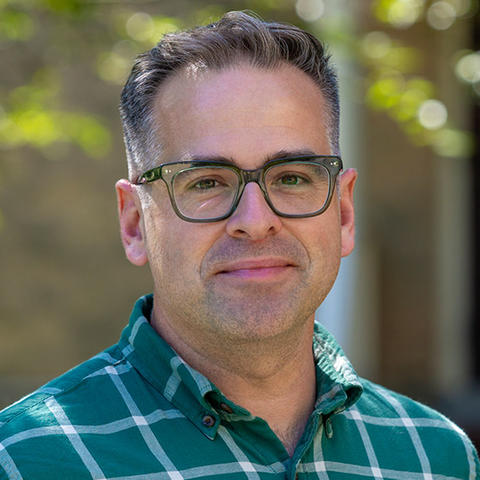Unlocking the Power of Bacteria

Photo by Patrick Montero.
Details
A National Institutes of Health grant renewal supports Professor Lou Charkoudian's exploration of the natural products produced by bacteria, the source of major antibiotic and anticancer medications.
Professor of Chemistry Lou Charkoudian holds a small glass jar fitted with a white cap. It contains a single gram of dirt obtained from Haverford's Nature Trail, a simple, everyday medium that carries an extraordinary bounty.
By Charkoudian's estimate, about 10 billion bacterial cells call that miniscule sample of soil home. Within it, the single-celled organisms flex their extraordinary protein assembly lines to create what scientists call natural products, an expansive variety of structurally complex molecules.
The process, called natural product biosynthesis, is at the heart of Charkoudian's research and has been supported by numerous grants, publications, colleagues, and Haverford students throughout the years. Now, Charkoudian has received a three-year, $462,351 grant renewal from the National Institutes of Health to continue her work in this arena.
"Bacteria are constantly making molecules so they can thrive in their environment," says Charkoudian, a member of Haverford's Class of 2003. "Those molecules can serve as sunscreen when bacteria are exposed to ultraviolet light, or antibiotics to fight off organisms competing for limited resources, or allow them to scavenge essential nutrients." She says others can facilitate communication among different bacterial species, whether friend or foe.
The incredibly complex molecules they create are the foundation for some of our most potent antibiotic and anticancer medications. About 50%, Charkoudian says, are natural products themselves or are derived from them, like doxycycline, which is sourced from a species of Streptomyces bacteria and used to treat everything from acne to Lyme disease. In some cases, the natural products receive a slight chemical twist in the lab, she says, to make them more effective in humans.
"Many of the antibiotics you have probably heard of actually originate from natural products manufactured with renewable resources by microorganisms that live in the dirt," Charkoudian says.
While this natural wonder has already paid immense dividends in terms of health and medical advancements, Charkoudian and other scientists in her field believe we've only scratched the surface of what's possible. The holy grail for her field, Charkoudian says, is to be able to harness a bacterium's assembly line process in a lab setting, leveraging the power of biological worker proteins by combining them in new ways of feeding them new molecular building blocks to create something entirely new. Doing so would unlock sustainable access to countless "unnatural" natural products with immense potential in their ability to benefit human health or society.
This grant is specifically focused on acquiring a better understanding of acyl carrier proteins, which play a central role in the biosynthesis of many natural products by carrying molecular building blocks and intermediates to the other proteins in the assembly line. "Think of them as a FedEx delivery truck," Charkoudian says. Unlocking its molecular ground rules would allow for the strategic engineering of natural products to create a target molecule that might not be something nature produces itself.
Beyond medicine, Charkoudian points to possibilities like biofuels that could be used for heating, transportation, and energy generation. "If you think about the fact that more than half of our antibiotics and anti-cancer agents come from this source," she says, "what other possibilities are out there that we don't even know about yet?"
From the outset, Haverford students have played a key role in Charkoudian's research in this arena, and their participation is fundamental to her pedagogy. More than 25 contributed to the work presented as preliminary data for a 2022 National Science Foundation grant, and over 100 have earned co-authorship on manuscripts that have emerged from her lab.
"Our scientific goal is to study natural product biosynthesis to gain sustainable access to important chemical diversity," Charkoudian says. "An equally important goal is to leverage our research to expose undergraduate students to research concepts and techniques. Our big win is to empower diverse STEM-appreciative, ethical, and compassionate citizens ready to tackle the emerging challenges of our time."




